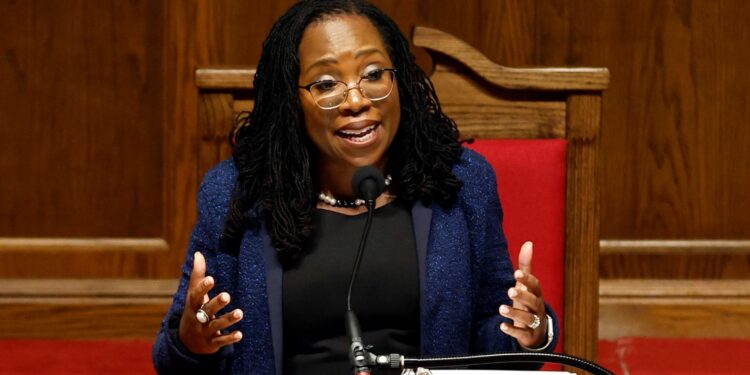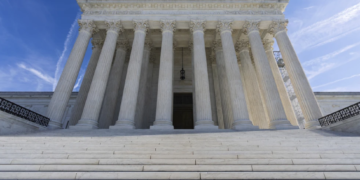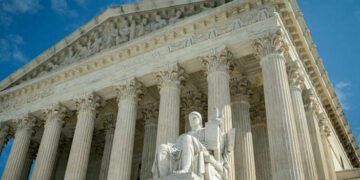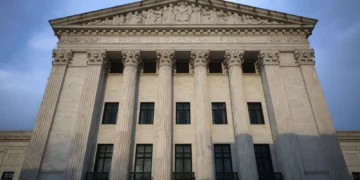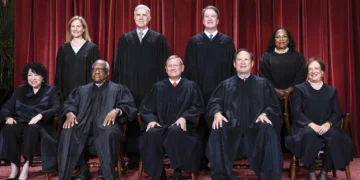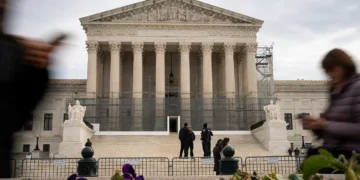June 28, 2025 Story by: Publisher
In one of the most consequential Supreme Court rulings of 2025, the Court curtailed the authority of federal judges to issue nationwide injunctions, a major shift in the balance of judicial and executive power. The decision, Trump v. CASA, sparked a rare and impassioned dissent from Justice Ketanji Brown Jackson, who warned that the ruling greenlights executive lawlessness and fundamentally threatens constitutional governance.
Writing separately in dissent—even as she joined Justice Sonia Sotomayor’s principal dissent—Jackson laid out a sobering and deeply historical argument for judicial authority to restrain unconstitutional acts by the Executive Branch, calling the majority opinion “profoundly dangerous.”
Universal Injunctions and Executive Power
At the center of the dispute was whether lower courts have the power to issue universal (or “nationwide”) injunctions—court orders that block a federal policy from applying to anyone, not just the plaintiffs in a case. These types of orders have been used in recent years to block a variety of presidential initiatives, including immigration rules and executive orders affecting civil rights.
The majority, led by Chief Justice John Roberts, held that such relief exceeded the equitable powers of federal courts under the Judiciary Act of 1789. Justice Amy Coney Barrett, writing a concurring opinion, labeled the dissent’s view as promoting an “imperial judiciary.”
But Justice Jackson had a sharp retort: the real danger, she argued, is an “imperial Executive.”
“An Existential Threat to the Rule of Law”
Jackson’s dissent begins with a powerful warning:
“The Court’s decision to permit the Executive to violate the Constitution with respect to anyone who has not yet sued is an existential threat to the rule of law.”
She argued that the case is not about the technicalities of 18th-century English equity jurisprudence, as the majority framed it, but rather about a fundamental question of modern constitutional governance:
“May a federal court in the United States of America order the Executive to follow the law?”
Her answer is emphatic: “To ask this question is to answer it.”
The Judiciary’s Role in Checking Power
Tracing her reasoning to the founding era, Jackson reminded the Court that the federal judiciary was explicitly created to constrain arbitrary executive authority. She stressed that the rule of law requires courts to have the power to enforce the Constitution, regardless of who breaks it:
“Stated simply, what it means to have a system of government that is bounded by law is that everyone is constrained by the law—no exceptions.”
Jackson warned that limiting court power to issue broad injunctions against unconstitutional executive actions would create a “zone of lawlessness”:
“To conclude otherwise is to endorse the creation of a zone of lawlessness within which the Executive has the prerogative to take or leave the law as it wishes.”
Historical and Philosophical Foundations
Citing foundational thinkers like Montesquieu and James Madison, Jackson underscored that the separation of powers is designed not for governmental efficiency, but to restrain potential abuses:
“Our system of institutional checks thus exists for a reason: so that ‘the private interest of every individual may be a sentinel over the public rights.’”
This warning carried echoes of past Supreme Court jurisprudence, invoking Youngstown Sheet & Tube Co. v. Sawyer and Cooper v. Aaron to emphasize that no one—not even the President—is above the law.
Why Courts Matter
According to Jackson, the role of courts in a constitutional republic is not optional but essential:
“The federal courts were thus established ‘not only to decide upon the controverted rights of the citizens as against each other, but also upon rights in controversy between them and the government.’”
She lamented that the majority’s reasoning ignores this bedrock function. Rather than serving as guardians of individual liberty and the Constitution, the Court’s new rule may effectively “sanction a tyranny.”
The Executive’s Bid for “Unlawful Behavior”
Perhaps the most dramatic moment in Jackson’s dissent is her reframing of the executive’s legal argument. She suggests that, stripped of legalese, the government is essentially asking for permission to continue unlawful conduct without being challenged by the courts:
“It is important to recognize that the Executive’s bid to vanquish so-called ‘universal injunctions’ is, at bottom, a request for this Court’s permission to engage in unlawful behavior.”
She accuses the majority of acquiescing to this request:
“With its ruling today, the majority largely grants the Government’s wish.”
Consequences for Constitutional Rights
Jackson also noted that Congress has independent mechanisms to check executive overreach—like control over federal funding. But in cases involving constitutional violations, the courts are the only line of defense:
“When the Executive violates the Constitution, the only recourse is the courts. Eliminate that check, and our government ceases to be one of ‘limited powers.’”
By restraining the equitable powers of judges, the Court risks leaving unconstitutional policies in place until every affected person individually sues—an unrealistic and unjust expectation.
What the Majority Ignored
The dissent further criticized the majority for not even evaluating whether the Executive’s policy (Executive Order No. 14160, which affects birthright citizenship) was lawful. Lower courts had already concluded it likely violated the 14th Amendment. Yet the Supreme Court allowed the policy to proceed against non-parties to the original lawsuits, undermining judicial consensus without engaging its merits.
“Notably, the Court has not determined that any of the lower courts were wrong… But the majority allows the Executive to implement this order… nonetheless.”
A Judiciary Shrinking from Its Duty
Concluding with deep dismay, Jackson declared:
“The very institution our founding charter charges with the duty to ensure universal adherence to the law now requires judges to shrug and turn their backs to intermittent lawlessness. With deep disillusionment, I dissent.”
This final line reflects the gravity of Jackson’s concern: that in ceding equitable remedies to historical abstraction and procedural caution, the Supreme Court may be inviting a more dangerous erosion of constitutional democracy.
A Defining Moment in Modern Judicial History
Justice Jackson’s dissent is likely to be cited for years to come. With her warning against “unchecked, arbitrary power,” she positions herself within a long lineage of jurists who saw the courts not just as passive referees, but as active stewards of the constitutional order.
Her dissent is not just a legal rebuke—it’s a philosophical and civic alarm bell. In her view, if courts can no longer broadly enforce constitutional limits, then the very idea of a government bound by law is in peril.


